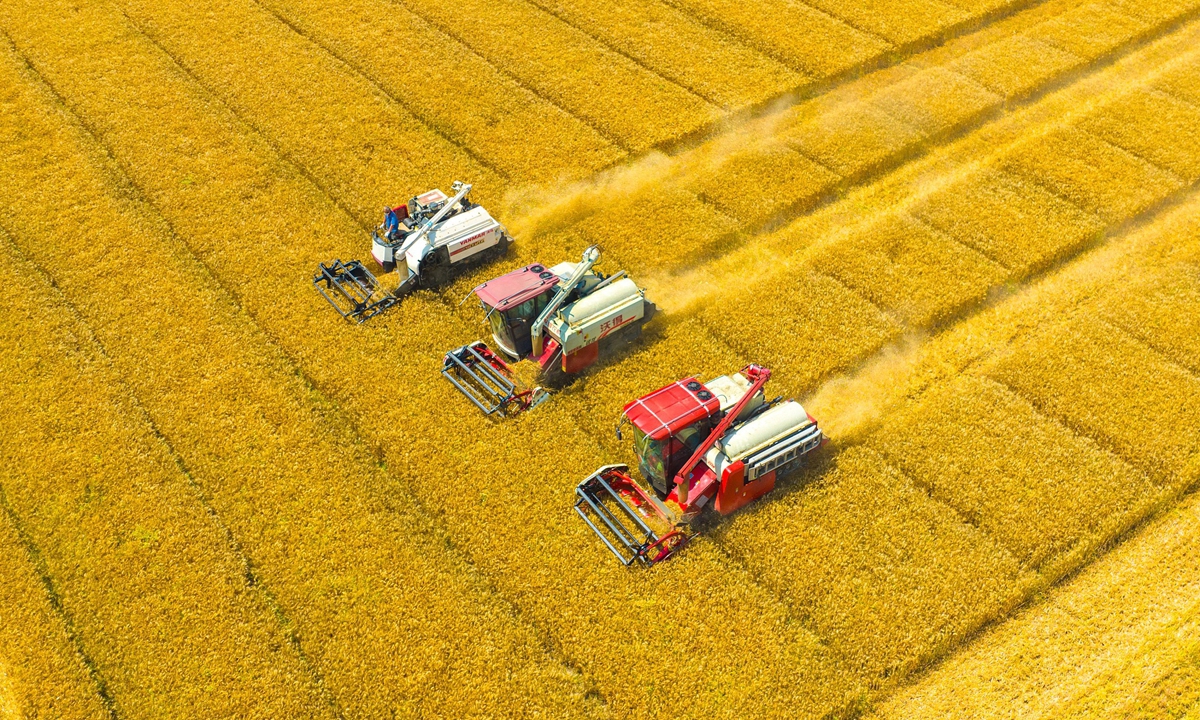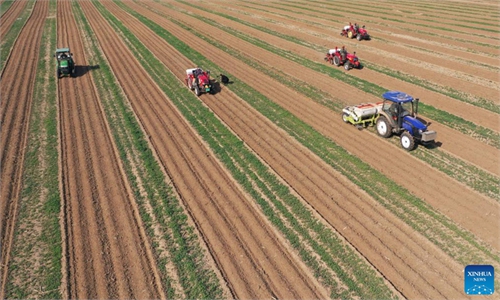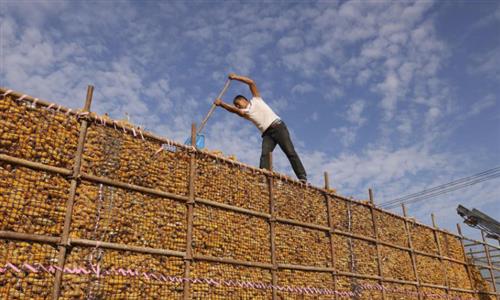CPPCC members highlight tech innovation, seed revitalization to ensure food security as China eyes more than 650m-ton grain output in 2024

Photo: CFP
Food security is one of the core issues being discussed during the annual two sessions in China, with political advisors in the agriculture sector emphasizing the need for technology innovation and seed revitalization to ensure stable food supplies.
In 2024, China's target for grain production is more than 1.3 trillion jin (650 million tons) according to the Government Work Report submitted on Tuesday to the national legislature for deliberation.
This is the fourth consecutive time since 2021 that the State Council, the cabinet, has included annual grain production targets in the Government Work Report, highlighting China's intensifying focus on food security and firmly holding its rice bowl in its own hands, according to media reports.
China will step up efforts to ensure the stable production and supply of grain and other major agricultural products, according to the Government Work Report. All local governments must shoulder their share of responsibility for ensuring national food security, it said.
The Global Times has interviewed several members of the 14th National Committee of the Chinese People's Political Consultative Conference (CPPCC) to get their views and suggestions on the issue of safeguarding food security.
Some suggestions from members included optimizing land resources, improving grain yields through technology, promoting new crop varieties and cultivation techniques, and investing in seed research and development (R&D).
Li Baoju, a member of the CPPCC National Committee, and also a research fellow at the Institute of Vegetables and Flowers, Chinese Academy of Agricultural Sciences, emphasized the importance of utilizing land resources and developing facility agriculture, which refers to using engineering technology to provide suitable growing environments for agricultural products to obtain higher economic benefits, to ensure food security in China.
"By developing facility agriculture, we can grow crops on non-arable land, deserts and saline-alkali land, freeing up land for growing food," Li told the Global Times.
Chai Shouxi, a member of the CPPCC National Committee and a professor at Gansu Agricultural University, said that ensuring food security relies on technological innovation.
"To guarantee food security, we must first ensure the availability of arable land and overcome constraints on agricultural production. This includes controlling disasters and increasing yields per unit of area," Chai told the Global Times.
China is undertaking continuous R&D in terms of new agricultural technologies, which are beefing up the country's industrial modernization.
According to the Ministry of Agriculture and Rural Affairs (MOA), the contribution rate of agricultural scientific and technological progress exceeded 63 percent in 2023, with the overall mechanization rate of crop cultivation and harvesting reaching 73 percent.
Ma Zhongming, a member of the CPPCC National Committee and director of the Gansu Academy of Agricultural Sciences, told the Global Times that it is necessary to increase grain yields through technology, promote new varieties, expand water-saving and drought-resistant cultivation techniques, and deepen diversified planting techniques to guarantee stable grain production.
Ma also called for the strengthening of the R&D of the seed industry. Efforts should be made to enhance the evaluation and utilization of germplasm resources, increase the application of biotechnology in breeding, and invest in funding and brand building.
China has boosted its biological breeding industry through scientific and technological methods, contributing greatly to the country's steady supplies of grain and other major agricultural products.
In 2023, China successfully developed a batch of salt-tolerant wheat and short-growing winter rapeseed varieties. The market share of domestic white-feathered chickens exceeded 25 percent and they were exported for the first time, according to the MOA.
China's central authorities unveiled a detailed roadmap for effectively advancing the nation's rural vitalization in its No.1 central document for 2024, the first policy statement the central government releases at the beginning of each year, which focuses on agricultural and rural issues.
Among the six priorities listed in the No.1 central document is ensuring food security. Specifically, the document called for maintaining grain output of more than 1.3 trillion jin in 2024 through various means, including increasing unit yields. It also called for strengthening technological innovation in agriculture.
China's grain output has remained stable at more than 1.3 trillion jin for nine consecutive years.
Despite frequent and extreme natural disasters last year, China achieved a record high total grain output of 1.3908 trillion jin. Per capita grain reserves reached 493 kilograms, exceeding the internationally recognized food security line of 400 kilograms, Minister of Agriculture and Rural Affairs Tang Renjian told a press conference at the two sessions on Tuesday.



